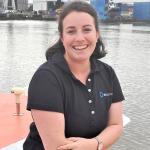There is a growing global movement of people who are appalled by this, and are mobilizing to address these issues both at critical intervention points as well as at source. It is no longer possible to plead ignorance in the production, use and irresponsible discarding of problematic waste materials.
Globally, ports are highly important trade and transportation networks, and have major significance in the development of surrounding coastal and urban areas. The Durban Port, situated on the east coast of South Africa, is a modern, highly industrialized port and the busiest in Africa, handling 32% of all ships calling at South African ports. Whilst the port remains significant from an ecological perspective, it is considered a highly transformed and degraded system due to the influx of pollution, runoff from the city and other industrial activities, becoming a hotspot for pollution that impacts environmental and social sustainability.
There is, however, a silver lining, as this presents an opportunity for a co-ordinated project to restore a clean and healthy environment that further stimulates nature-based industries as well as improving efficiencies of all activities in the port and providing much needed job opportunities. It also creates an opportunity for action-based research that generates environmental awareness.
In 2019, the WILDOCEANS Blue Port project was established with the specific goal of progressively cleaning up the Durban Port ecosystem and returning it to a healthy, natural state. With support from Grindrod Bank, the Blue Fund and the National Youth Employment Services (YES) programme, funded by Nedbank, WILDOCEANS has enabled capacity building and work experience in the Blue Port project for 50 local unemployed youth annually. Addressing a remarkably high youth unemployment rate of 42% in South Africa, the YES programme aims to expose youth to the blue-green economy, and enable future employment through education and training received while employed on the project. Although the project is currently delayed due to Covid-19 implications, the Blue Port crew will continue their work when it is safe to do so.
The project has also begun trialing low-cost, waste-trapping interventions to manage waste input from its three main catchments, and has created a mobile app for port users/stakeholders to openly communicate in the port. The app serves as a platform for transparent reporting of waste accumulation, spills or other pollution events, to create a cooperative, well-maintained resilient system benefiting all its users.
The solid waste collected by the Blue Port crew is sent to a buy-back centre where it is sorted and wherever possible, recycled. Through close collaboration with local partners, by using innovative technologies to turn plastic waste into long-term valuable items (including pavers for local municipality, public spaces and school yards), we aim to close the loop of the waste process and remove the waste out of the environment.
Whilst the Blue Port project focuses on a circular approach to waste collection, it is challenging in a country that largely subscribes to a linear, extractive economic model. Thus, supplementary to the actual collection activities, the project is actively involved in raising awareness of the benefits of a circular approach through social media on our WILDOCEANS Waste_UPRISING platform.
Going forward, WILDOCEANS aims to promote collaboration and co-ordination between all stakeholders who make use of the port, to establish Durban Port as a prime contributor to a thriving blue-green economy, enabling sustained socio-economic and environmental resilience.
About the author

Rachel Kramer is the Strategic Manager for WILDOCEANS, overseeing a number of projects focused on conservation and capacity building in the marine space, including work in the Durban Port, South Africa.
WILDOCEANS is the marine programme of the WILDTRUST, a Southern African non-profit, non-governmental organisation. The WILDTRUST’s vision is a “Sustainable Future for All”. By working at the critical interface between environmental conservation and socio-economic advancement, the WILDTRUST aims to support resilient ecosystems through the development and facilitation of innovative solutions, which promote social inclusiveness and sustainable development.






